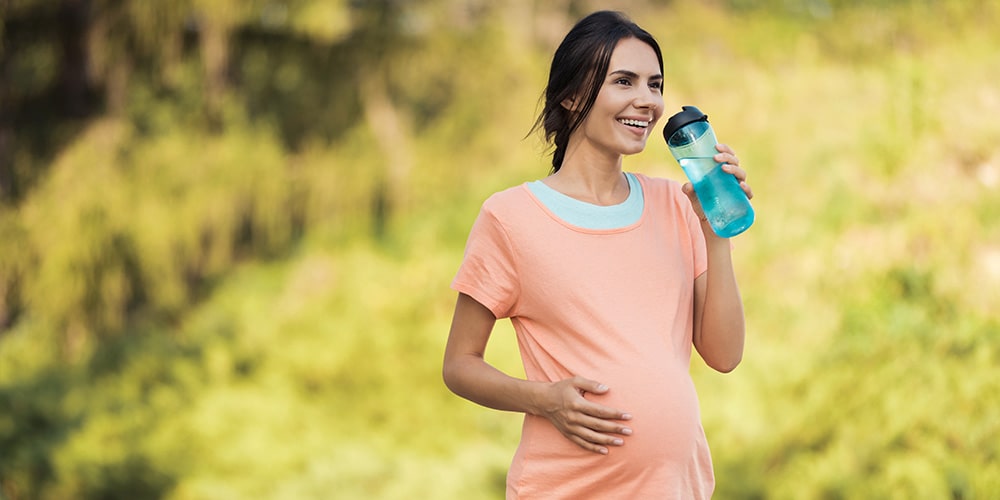
Can I Exercise During Early Pregnancy? What Is Safe?
Tuesday, February 9, 2021
Whether you were active before getting pregnant or you're just getting into exercise, hoping to prepare your body physically for birth, you may be wondering whether or not it's safe to exercise during early pregnancy.
The short answer is usually yes -- you can exercise in the early stages of pregnancy. Some women can even continue exercising until birth. However, it's always best to consult your doctor and GP.
Here, we're exploring the benefits of exercising while pregnant, what exercises you should avoid while pregnant, and tips to get started on your pregnancy exercise routine with the help of a Women's Health Physiotherapist.
Benefits of Exercising When Pregnant
In most cases, exercising during early pregnancy is completely safe. In fact, there are many benefits to remaining active during your pregnancy. Here are a few examples.

Exercise to Feel Better
It's no secret that pregnancy is hard on a woman's body. From morning sickness to carrying around the extra weight, it's common for pregnancy to make women feel rather wretched.
Exercising releases endorphins (the feel-good hormone) and improves your mood. Plus, getting your blood flowing through exercise can relieve back pain and constipation associated with pregnancy.
You'll also be strengthening your joints as you take on more and more weight from your growing baby and you'll likely sleep better at night too. All of these benefits work together to help you feel better throughout your pregnancy.
Prepare Your Body for Birth
Giving birth is extremely physical. Although it's also a natural process, women in better physical fitness generally have an easier birth since their bodies are better prepared.
Strong muscles, joint flexibility, a fit heart, and the ability to control your breathing will all be extremely beneficial during childbirth. It's a huge reason why, if you can, it's definitely recommended that you continue to exercise during pregnancy.
Return to Normalcy Quicker Post-Pregnancy
By exercising during your pregnancy, there's less of a chance that you'll gain more weight than necessary. Before we go any further on this point, it should be clear that you should NOT be focusing on weight loss during pregnancy. It is normal and healthy to gain weight during pregnancy, even apart from the weight of your baby.
However, using pregnancy as an excuse to eat poorly and avoid taking care of your body will only make it harder in labor, as we mentioned, but also post-pregnancy.
It's ok not to go back to your pre-baby body. In fact, it might never happen as giving birth is a miraculous and incredible process your body will go through. Still, for any new parent, self-care will never be unimportant.
In reality, making sure your body and mind are as healthy as possible through regular exercise is actually good for your child no matter their age.
So, exercising during pregnancy, if it's cleared by your doctor, will make returning to your self-care exercise routine post-pregnancy a lot easier.
Exercise to Avoid During Pregnancy
Everyone's body is different and every pregnancy is different. If you're a high-risk pregnancy, you might not be able to do much exercise at all. However, even if you've had a relatively easy pregnancy, there still some exercises to avoid.
What exercises should be avoided during pregnancy include:
- Bouncing, jarring movements, and leaping should be avoided
- Exercises with a potential of falling like horseback riding, rock climbing, or other extreme sports
- Exercises with potential for extreme contact including sports like football or soccer
- Exercises requiring sudden changes in direction like tennis
- Exercises with extreme changes in air pressure like scuba diving
- Exercises that are done lying on your back for extended periods especially after the first trimester
- Exercises that increase your body temperature too much
Best Exercises to Do During Pregnancy
The best pregnancy exercise for beginners is anything low impact. These exercises include:
- Swimming
- Pre-natal yoga and stretching
- Pre-natal Pilates
- Walking
- Dancing
- Aerobics exercises
However, the best way to exercise while pregnant has a lot to do with how active you were before falling pregnant. If you were a runner or lifted weights before, you might be able to continue with your regular routine, although modified.
Always check with your doctor to learn about the best ways to exercise during pregnancy or meet with one of our women's health physiotherapists who can point you in the right direction.
Tips to Getting Started
If you're just getting started with exercise during your pregnancy, here are a few tips.
Start slow.
Knowing which month to start exercise during pregnancy is sometimes irrelevant. In the early stages, you might not even realise you're pregnant.
Generally, it's safe to continue exercising as normal for the first trimester. Just start slow, especially if you're a beginner to fitness.
As always, check with your doctor to be sure. Your doctor might also advise when exercising during pregnancy at your current level is no longer recommended.
Don't go for the burn.
Many exercise programs encourage us to “go for the burn” and push ourselves in our workouts. However, even in the earliest stages of pregnancy, it's best to skip the burn and back off.
You'll know that you've gone too hard when you feel more exhausted than energised after your workout or if you're too out of breath to have a conversation.
Keep cool.
While pregnant, your body temperature will naturally increase. Therefore, it's even more important than normal to make sure you're keeping cool during your pregnancy exercises.
Exercise indoors with aircon and avoid activities in the direct sun. Also, be sure to wear breathable clothing and sun protection if you are outside.
Eat well.
Just as important to fitness as exercise, nutrition should also be a major consideration during pregnancy.
Not only will healthy foods help you stay energised enough to exercise through your pregnancy, but also, depending on your pre-pregnancy weight, you'll need about 340 extra calories per day starting in the second trimester.
The phrase “eating for two” comes to mind. But, although you shouldn't be eating twice as much food, you should also choose energising foods and only indulge now and then.
Stay hydrated.
Dehydration is a major issue even if you're not pregnant. However, it can lead to overheating in pregnant women which is dangerous for mother and baby. Dehydration can even trigger early contractions and is overall putting your body under stress.
So, make sure you're drinking plenty of water before, during, and after your pregnancy workouts. A good rule of thumb is drinking water until your urine is clear.
Work with a physio.

Last but not least, getting professional advice about your pregnancy exercise plan is definitely encouraged. A pre-natal physio will guide you through safe, effective exercises to help you strengthen your pelvic floor and stay as fit as you can to help you through labour.
Your physio can also work with you post-natally to help you safely recover from birth and regain any strength you may have lost, especially in your abs.
Book an appointment with one of our knowledgeable Women's Health Physiotherapists today! Come to one of our convenient Australian locations or take advantage of our mobile & physio services. Contact us now!
Other Useful Resources
When should I start to exercise after my pregnancy?
Pregnancy 101 – How your body changes during pregnancy
10 ways to decrease pelvic pain in pregnancy
Back pain during pregnancy. How to ease your pain
Safe exercises to do when pregnant
This article was originally written by Jonathan Moody from Physio Inq

